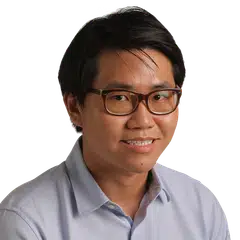World suffers if US-China relations fray with tariffs: PM Wong
Sign up now: Get ST's newsletters delivered to your inbox

The US views China as a strategic competitor and threat to be dealt with now, while the US still has the advantage, PM Lawrence Wong said.
PHOTO: AFP
SINGAPORE – There will be disastrous consequences for the world if disputes between the US and China escalate, destabilising the relationship between both countries, said Prime Minister Lawrence Wong.
In a wide-ranging speech on the impact of US tariffs in Parliament on April 8, he outlined the potential impact of the Trump administration’s move on US-China relations.
The US views China as a strategic competitor and threat to be dealt with now, while the US still has the advantage, he said.
He added: “China says it is ready for a tariff war, a trade war, or any other type of war. The US has now threatened an extra 50 per cent tariff on China,
And there are fewer channels for dialogue, which can serve as guard rails to manage the relationship, he said.
“We must be mentally prepared. The predictable and rules-based order we once knew is fading,” PM Wong said.
“The new era will be more volatile, with more frequent and unpredictable shocks. We must be ready to stand firm, and protect our interests, no matter how the external winds may blow.”
America’s tariff moves arise from a sense that the US has given away too much in allowing China to join the World Trade Organisation (WTO), and that China competes on an unfair basis by heavily subsidising its own companies and restricting market access to US firms, PM Wong said.
Such views may arise with people from hollowed-out towns in what was once America’s thriving industrial belt, where jobs have disappeared and workers’ incomes stagnated.
“They believe that the American economy is fundamentally broken,” PM Wong said, noting that the US objectively continues to enjoy unrivalled economic heft in totality.
But America’s concerns should be addressed within the WTO framework, he said.
“In particular, the trade arrangements and concessions made in the past when China was only 5 per cent of the world’s economy should be updated when China now makes up 15 per cent of the world’s GDP (gross domestic product).
“And if there are disagreements, they should be resolved through the WTO’s dispute settlement system, which has been paralysed, and urgently needs to be restored and reformed.”
He added: “But what the US is doing now is not reform. It is rejecting the very system it created.”
PM Wong noted that Asia bears the brunt of the US tariff increases, with China the hardest hit in the region.
With China, the 34 per cent tariff laid out this round adds to a 20 per cent tariff increase imposed over the past two months, and a further 20 per cent from the first Trump administration, PM Wong said.
“Taken together, the average US tariff on Chinese products now exceeds 60 per cent.”
Meanwhile, tariff rates range from 10 per cent to 49 per cent in South-east Asia, he added.
Singapore was among the countries hit by a “baseline tariff” of 10 per cent
PM Wong said: “These measures will accelerate the fracturing of the global economy.
“Instead of flowing based on economic efficiency, capital and trade will increasingly be diverted based on political alignment and strategic considerations.”
A total of 14 MPs, including Leader of the Opposition Pritam Singh, rose to ask questions after PM Wong’s speech.
Nominated MP Neil Parekh asked if the Government would direct Singapore’s “sovereign wealth system” to make investments in the US if asked to do so as part of tariff negotiations.
This includes investment companies GIC and Temasek, which are managed independently, Mr Parekh noted.
PM Wong said these funds, which have major investments in America today, operate “strictly on a commercial basis... and not for diplomatic or political considerations”. They will continue to adopt this approach.
“If, indeed, the continued investments that Singapore as a whole is making in the US help advance a bilateral relationship, so much the better,” he said.
Mr Parekh and Workers’ Party MP Jamus Lim (Sengkang GRC) both asked about the use of anti-dumping duties to curb a potential influx of low-priced imports from countries facing higher tariffs. This would be aimed at supporting domestic firms.
Deputy Prime Minister Gan Kim Yong said anti-dumping duties are provided for under the WTO. But Singapore consumers will end up bearing the cost of such duties, he said, adding that Singapore’s industries are competitive and mostly export-oriented.
“Therefore, I think we have to be very careful in considering introducing anti-dumping duties,” said Mr Gan, who is also Trade and Industry Minister.
Mr Xie Yao Quan (Jurong GRC) asked how the void in global leadership left by the US can be filled, and about the role Singapore can play.
PM Wong said Singapore will not be able to fill the vacuum itself, but can do its best to speak up, corral and engage like-minded countries.
He also said the Government intends to strengthen trade links with promising areas, including parts of Latin America and the Middle East, in an earlier reply to Mr Liang Eng Hwa (Bukit Panjang).
While Singapore will engage with the US on whether it can address any misperceptions about bilateral trade, PM Wong cautioned that if the US decides the 10 per cent rate is a universal one, it ultimately reflects its worldview and transcends bilateral considerations.
Singapore continues to value other aspects of the overall relationship with America, he said.
“We believe the US values it, too, in areas like security and defence. We have such a close relationship built up over many decades and we will continue to maintain that – and we will also discuss cooperation in new areas like critical new technologies as well as energy.”



